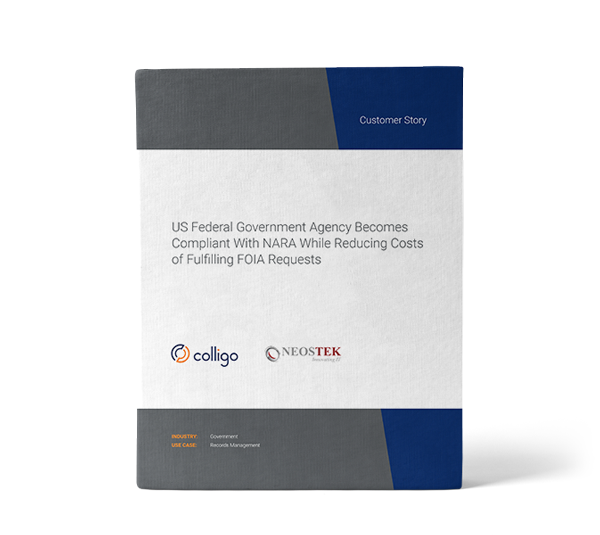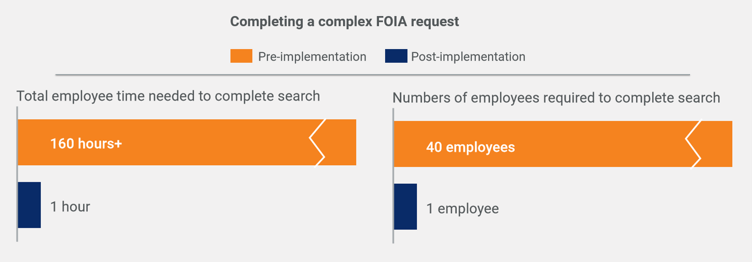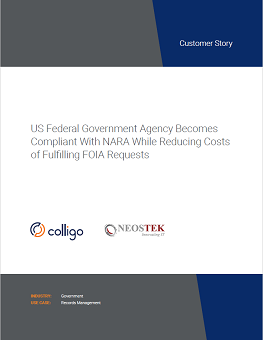Case Study
US Federal Government Agency
US Federal Government Agency Becomes Compliant With NARA While Reducing Costs of Fulfilling FOIA Requests.

For US federal government agencies, records and information management (RIM) is an integral part of everyday work. They must comply with memorandums and directives for record classification and retention. This is in part to enable them to respond to the constant stream of Freedom of Information Act (FOIA) requests that many Federal agencies receive. When a FOIA request is received, the agency must be able to produce all records pertaining to the issue in question. Many of these are email records.
Complying with National Archives and Records Administration (NARA) recommendations represents a significant step forward in RIM practices for many US federal agencies today, where the practice in many departments is to print emails and then store them as paper records. While reliable, this method is slow and cumbersome and consumes numerous person-hours at significant expense.

Results
Reduced costs and saved time
Reduced time to respond to complex FOIA requests from 160 hours to 1 hour—a savings of almost $24,000 per request
Achieved high user adoption
Achieved 100% user adoption of the new process; no new process steps were required
NARA maturity model gains
Became compliant with Federal RIM Program Maturity Model and the Universal Electronic Records Management Requirements

Business Challenge
All government agencies have been challenged in the governance of email records since the issuance of the Managing Government Records Directive, M-12-18 (dated August 24, 2012) addressing the heads of all executive departments, agencies, and independent agencies. The overarching message of the directive references the 2012 Presidential Memorandum, “Managing Government Records“, which defined the government’s objective of “Improving records management [to] improve performance and promote openness and accountability by better documenting agency actions and decisions.
For the Agency, RIM practices to ensure compliance with M-12-18 and the ability to respond to FOIA requests involved complicated processes which were a burden on individual employees. Employees were tasked to set up specific folders in their archive inboxes in which they stored records—embedded in Outlook PST files. This approach made responding to FOIA requests problematic and error prone for a number of reasons:
Time consuming manual processes. When complying with FOIA requests, it was a manual process at the employee level to search and respond. In addition, it was not uncommon for more complex requests to impact for multiple employees. A complex request could include an electronic search of various share drives, personal drives and email, as well as of paper files in desks, file cabinets around the office, and file rooms. The requests usually had a short turnaround time and almost always interrupted the employees’ regular work.
Findability issues when people were out of office. When employees went on planned or unplanned absences, took vacations, were away due to illness, or were terminated, it was difficult for those still at work to track down the PST files needed to complete a request. This increased the time needed to respond.
A lack of email meta-data. By maintaining emails in PST files, no additional meta-data was captured that could have been used to facilitate searches. As a result, sophisticated searches of anything beyond plain keyword searches of the subject line, sender, or recipient were impossible. It was a time-consuming and subjective exercise to review each keyword search result and decide if it had anything to do with the FOIA request. This increased the risk that not all the pertinent records could be found.
Scattered information. By using PST files as the archiving file format, information ended up scattered across drives, embedded within multiple PST files. This only increased the complexity of searching, and opened greater risk that individual files would become corrupted and the records within them lost.
Lack of public trust. There have been multiple recent news reports covering FOIA request responses from government departments and agencies, revealing that other searches have found records that were not previously provided. This undermines the public’s in Government and was an embarrassment to senior management, who could not be confident that their manual processes were adequate.

Solution
To address the requirements of M-12-18, NEOSTEK identified and implemented an end-to-end records management solution at the Agency which completely addressed the automation of emails as a record. The core enabling technology was Colligo Email Manager, an Outlook plug-in which seamlessly integrated SharePoint with Outlook within the native Outlook interface.
Simplified record capture. Now, capturing records is significantly simpler. Using Email Manager, employees simply drag and drop emails that qualify as records into a shared SharePoint folder. This same process can be used for non-email files dragged into the Outlook navigation pane. The system automatically captures some metadata, and prompts for more including content types to determine retention schedule .
Radically improved search capabilities. Critically, searching for records to fulfill a FOIA request is now much faster and more robust, with less chance that something will be overlooked. Information is now centralized and structured in SharePoint, meaning that a single search is all that is needed to identify appropriate records.
Deployed quickly. The underlying record management processes did not need to change, and no extensive training was required. In fact, the project team asked the first tranche of end users to present to upper management to demonstrate how easy it was.

How Colligo and NEOSTEK helped a US Federal Agency become NARA compliant and reduce FOIA costs
Download the extensive full feature PDF version.
Since implementing the new solution, the Agency has dramatically reduced the time needed to respond to FOIA requests, as well as the associated cost of inefficiency. Moreover, the Agency improved its record management practices in line with the federal maturity model, boosted compliance, realized 100% user adoption, and improved collaboration amongst employees.
Whereas complex FOIA requests could previously involve 40 or more employees each devoting 3-5 hours to complete a search, this search can be performed by a single person in under an hour. At a rate of $150/hour, this represents a $23,850 savings for each complex request. Each year, the Agency receives over 175 complex requests, representing a savings of over $4 million per year. With NEOSTEK’s know-how and the inclusion of Colligo as a key component of a fully automated FOIA search—keeping email searchable and accessible with metadata and no burden to end users—they’ve enabled the Agency to go from multiple people working for hours on FOIA requests to a single person for one hour.

